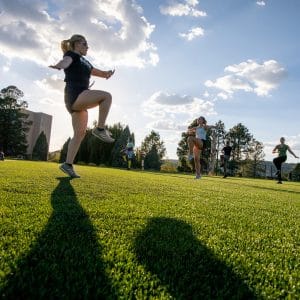When there’s a lot going on, it’s easy for sleep to take a backseat. However, when you stick sleep in the front seat, it actually has this amazing trickle-down effect to all the other areas of your life.
 When you get between 7 and 9 hours of sleep a night, your brain and body experience feel the difference. Benefits of sleep include: improved mood, memory, immune system function, and increased energy.
When you get between 7 and 9 hours of sleep a night, your brain and body experience feel the difference. Benefits of sleep include: improved mood, memory, immune system function, and increased energy.
And with more energy, you’ll feel like studying (ok, I realize this is a stretch), doing more meal planning, and moving your body. See it? Trickle down effects of sleeping goodness? It’s GOLD!
If this is an area you’re lacking, consider these 5 tips for falling asleep faster to catch the Zzzzzs you need for a busy week ahead:
Tip #1: Limit Screens
Our bodies have a built in timer known as the circadian clock. This clock is influenced by light, which tells our bodies to wake up, and dark, which tells our bodies to secrete melatonin (sleep hormone) and go to sleep.
When you expose your brain to a lot of light before you try to go to sleep, it can make it harder to fall asleep. Consider setting a go to bed alarm on your phone or use your downtime feature to have apps shut down at a certain time. (For iPhone click on settings, screen time, downtime, and then set the wake up and go to sleep times for your apps.)
Tip #2: Journal
Journaling can help clear your head just before bed. Have you ever been trying to fall asleep, and you feel like you can’t turn your brain off? Journaling can be a great outlet for this!
There are many different forms of journaling such as a gratitude list, meditation journaling, or just writing down how your day went!
 Tip #3: Get active
Tip #3: Get active
Research has shown that consistent enjoyable forms of movement can help you fall asleep fast and stay asleep. Exercise has also been shown to alleviate stress, which can make your brain calmer when you lay down to go to sleep.
Check out previous UCAN blogs like this one on how to get your body moving!
Tip #4: Read a Book
Reading a book can be a great alternative to scrolling through your phone when you’re trying to fall asleep. It can be a very relaxing tool that may help you get tired.
It’s important to select the right book for you – the kind of book that is enjoyable but that you can easily put down when it’s time for lights out.
Tip #5: Stick to a Schedule
Sticking to a schedule can be very beneficial when it comes to sleeping better. As mentioned earlier, our bodies have a circadian clock. When you stick to a schedule, your body will naturally begin to get tired at the same time each night.
The hard part is that this might mean not letting yourself sleep in too late on a day off or weekend. (Trust me though – this pays off when it comes time to hit the sack later that evening.) Aim to keep your go-to-bed and wake-up times within an hour most days of the week.